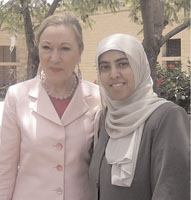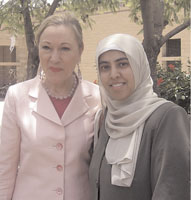
EC Commissioner Ferrero-Waldner:”Yemen needs a government that works for the people, not for itself” [Archives:2007/1049/Reportage]
May 10 2007
 |
75 million euros
The main achievement of the visit was to formalize the 2007-2010 assistance strategy the Commission designed for the country, which is accompanied by a 75 million Euros aid package. This strategy will focus on good governance, private sector development and human capital development., fighting poverty and food security, as well as supporting the civil society in Yemen. With this assistance, the Commission will contribute to improve governance, to alleviate poverty and help facilitate Yemen's integration into the world economy. Further resources could be drawn from specific instrument addressing thematic issues such as food security.
“We can not do the work for you, if you choose to develop your country and work for democracy and human rights then we would want to accompany you in your journey to achieve this and support you as much as we can. What is needed is a government that works for its people not for itself.” She said when asked what are the EC's objectives in Yemen during a lecture she gave at the college of Agriculture of Sana'a University. She also praised the democratic process through the elections last year and urged the Yemeni government to consider the recommendations stated in the EC observation mission, which came to Yemen during the elections in September 2006. “I have appointed Baroness Nicholson, whom I know is capable and loves Yemen, to supervise this issue again as we intend to send another mission in the coming parliamentarian elections in 2009.” She added in this regard.
On the education level, there are over thirty scholarships dedicated to Yemen through an agreement with Sana'a University. The commissioner urged the professors and lecturers to create links with various educational institutions in Europe in order to forge exchange opportunities for the academic staff. Economically, she promised to support Yemen's integration into the Gulf Council through bilateral talks with the various ministers at the summit in Riyadh.
Vision for Yemen
Ferrero-Waldner enthusiastically explained her vision for Yemen in the future. She hoped for Yemen to play a significant role in the region in international issues, in line with the government's positive intervention in Somalia. Yemen could also take a prominent role in fighting terrorism in the world. The commissioner believed in an economically strong future for Yemen through the integration with the GCC, which she personally will promote during her meetings in Riyadh.
“Yemen needs more cultural tourism to promote itself as a beautiful historic country. Educated people in Europe know about Yemen, especially the old history, but it important that they see for themselves. This is why it is important to sponsor expanded cooperation for culture and tourism,” she added.
She commended the government's National Reform Agenda, and agreed on the necessity of political and economic reforms to help Yemen's socio-economic development and give its people the standard of living they deserve. Explaining this she said: “Yemen has a great deal of potential, but it is potential which can only be realised if the right measures are put in place. With 50% of the population now below 16 years of age, there is no time to be wasted.”
She stressed on the importance of having a good judiciary system that promotes order and justice. Without those, she said, investment and economic development would be hindered. Yemen should learn from the experience of the European Union. Over 50 years ago, the 6 founding members of the EU decided it was time to create a solution for instability and this can only happen through strong economic ties. “The problem with Yemen today is that it does not have much time to achieve what we achieved in Europe over decades. This is why we want to share our successful experience with Yemen and help the country advance quicker.”
Arab Peace Initiative
Ferrero-Waldner's position as Commissioner of External Relations and European Neighbourhood Policy has multi role. Explaining this she said: “I am responsible Through the Neighbourhood Policy to build strong partnerships between the enlarged EU and our neighbours to the east and on the southern and eastern shores of the Mediterranean. However, as Commissioner for External Relations, I extend further towards third countries, fostering cooperation and promoting dialogue with our partners. And this is what I am doing now through my visit to Yemen.”
She added that the strength and unity of the European Union makes the EU a strategic partner for Yemen and any other country in the world.
The commissioner further talked about regional issues with emphasise on the Arab Peace Initiative. She has been to Israel and the occupied territory and confirmed that their role as mediators demands a neutral objective point of view without taking sides. She insitited that it is the Arab's and Isrealis reponsibility to make pecae not europe's or any other party. “I know how important this issues is to you as Arabs, but you have to be fair and see that the Arab world has not really been involved much in supporting Palestine in the previous years. It is only lately that a serious step has taken shape in the form of the 2002 “Peace – for – Land” initiative, which in my opinion is the solution. There is also the Meca Agreement, and everything is laid on the table, now it is time to take action and talk about the practocal details. If both sides really want to achieve peace they need to make compromises. We support Palestine today more than ever with over 700 million euros so far. However, to us Hamas is still a terrorist organisation and there is no justification to killing civilians whether Arabs or Israelis.”
It is the first visit of a of a European commissioner of this level to Yemen, Benita Ferrero-Waldner is the European Commissioner for External Relations and European Neighbourhood Policy and an Austrian diplomat and politician. She is a member of the conservative Austrian People's Party ( VP). She holds a PhD in Law from University of Salzburg and One of her most influential positions was Chef de protocole for Secretary General Boutros-Ghali at the United Nations in New York. She was took office at the EC late 2004, and is widley known for her being able to talk to 101 Heads of State in their native languages.
——
[archive-e:1049-v:15-y:2007-d:2007-05-10-p:report]


